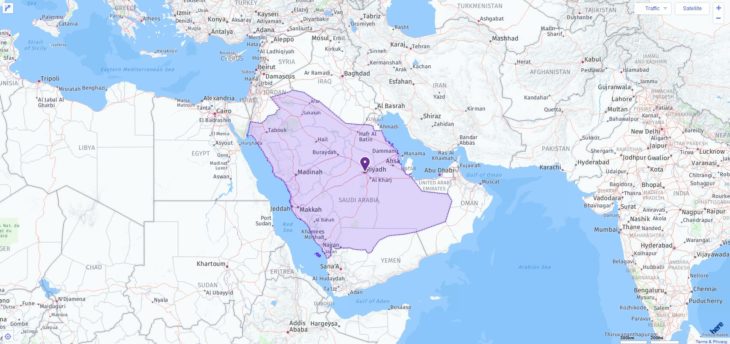Your search found 1 match. The following is the full list of ACT testing locations in Saudi Arabia among which you can pick one to take the exam. Please know that on the test day, test takers can use any 4-function, scientific, or graphing calculator. On the table below, you can also find all test dates through 2019.

2019-2020 ACT Test Dates in Saudi Arabia
| Test Date | Registration Deadline |
| February 9, 2019 | January 11, 2019 |
| April 13, 2019 | March 8, 2019 |
| June 8, 2019 | May 3, 2019 |
| July 13, 2019 | June 14, 2019 |
| September 14, 2019 | August 16, 2019 |
| October 26, 2019 | September 20, 2019 |
| December 14, 2019 | November 8, 2019 |
| February 8, 2020 | January 10, 2020 |
| April 4, 2020 | February 28, 2020 |
| June 13, 2020 | May 8, 2020 |
| July 18, 2020 | June 19, 2020 |
ACT Test Centers in Saudi Arabia
| City | Center Name | Center Code |
| Al Khobar | International Schools Group | 871050 |
More about Saudi Arabia
Country Overview
The Kingdom of Saudi Arabia with the capital Riyadh occupies three quarters of the Arabian Peninsula. The country is characterized by uninhabited sand and stone deserts. The climate is hot, dry inland, humid on the coast. Most of the population lives in oases and in the few cities that are on the Red Sea and the Persian Gulf, apart from Riyadh. The average age of the population is one of the lowest in the world. The majority of the population are Arabs. Most of them belong to the Sunnidenomination of Islam. 30% of the population are migrant workers.
The two most important holy places of Islam, Mecca and Medina, are in Saudi Arabia. State, law and social life are shaped by the strict interpretation of Islamic regulations. The sexes are strictly separated in public and in schools.
Saudi Arabia is an absolute monarchy. There is no parliament and no political parties. The Saud family has been the rulers of the Saud family as kings at the head of the state since 1932. The extraction and export of oil brought the country great prosperity and made it a leading power in the Middle East. The government of König (from 2015) Salman promotes economic sectors outside the oil sector in order to create jobs, especially for the younger generation.
Geography
99% of the area of Saudi Arabia are deserts or desert steppes. Behind the narrow coastal plain on the Red Sea, mountains rise steeply to 3,133 m: in the north the volcanic rocky landscape of the Hidjas, in the south the Asir Mountains. To the east, the mountains slowly merge into the approximately 1000 m high inner Arabian highlands, the Nedjd. Further to the east there are flat, undulating sand and gravel areas. The coast of the Persian Gulf is flat and has deep beeches. The red sand desert of Nefud extends to the north and the extremely inhospitable Rub al-Khali with its mighty dunes extends to the south-east. It forms the largest continuous sandy area on earth.
Little rainfall falls in the north in winter and in the south in summer. In large parts of the interior of the country, it often does not rain at all for years. The humidity on the coasts is very high and temperatures rise up to 45 ° C. Only the Asir Mountains, the only fertile natural landscape in Saudi Arabia, are moderately warm and relatively humid.
Population and Religion
Saudi Arabia has 33 million residents, the majority of whom are Arabs. Almost every third person is a migrant worker from other Arab countries as well as from South and Southeast Asia. Due to the desert nature of the country, the population is concentrated in a few urban centers such as Riyadh and Djidda as well as the oases. In the second half of the 20th century, most of the residents gave up their nomadic or semi-nomadic way of life as Bedouins. Today four fifths live in cities. Saudi Arabia is one of the countries with the youngest population in the world: 70% of the population are under 30 years of age.
All citizens and most of the Arabs living in Saudi Arabia profess Islam. The vast majority of citizens are Sunnis. There is also a Shiite minority. The kingdom is committed to a particularly strict form of Sunni Islam, Wahhabism. The king bears the title “Guardian of the two holy places”: Mecca, the hometown of the Prophet Mohammed , and Medina, the place of the first Muslim community. Criticism of Islam will not be tolerated. Non-Muslim foreigners are only allowed to practice their faith in private rooms.
The sexes are strictly separated in public, at work, in schools and universities. Personal contact between unrelated women and men is taboo. Women have fewer rights than men, for example in marriage and family or when choosing a career. There are also special dress codes for women: their body must be completely covered. Some bans on women, such as driving a car or attending sporting events, were lifted in 2018. In the field of education, the sexes are almost equal. However, there is no compulsory education. The three dozen state and private universities also have their own women’s university, Princess Noura bint Abdulrahman University in Riyadh with around 60,000 female students.

